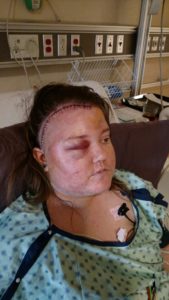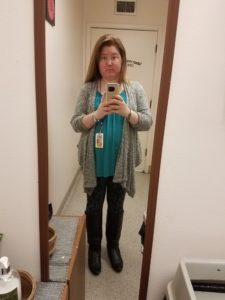
Danielle before Cushing’s
I started having serious health issues after my freshman year of college. I was 18 years old and extremely active with two jobs and in college with upper division courses. Physically, emotionally, and mentally I was working overtime. My symptoms started with a 20 lb weight gain and a significant case of acne. I was put on Accutane by my dermatologist for five months which did not fix the acne. My face got worse and I continued to gain weight. For years I exercised like crazy, tried different things, and ate healthy; still no change. In fact, I continued to gain weight. It felt like I was constantly going in for bloodwork and had multiple tests and ultrasounds. I also saw numerous specialists including my primary care doctor, a kidney and nutritionist specialist, my gynecologist, etc. They all kept telling me that things were normal, and I just needed to lose weight, go on a low sodium diet, etc.
I went a total of 4 ½ years being misdiagnosed. Eventually I was referred to an endocrinologist by my gynecologist for something I thought was unrelated, but now I’m not so sure. Before even giving him my list of symptoms and issues he knew by my appearance that something wasn’t right.
I met my endocrinologist on June 26, 2017. Repeated testing confirmed his initial suspicion, and we scheduled an MRI to find the tumor. They confirmed a 17mm tumor on my pituitary gland; this is extremely large compared to an average Cushing’s case where the average tumor is more like 6-8 mm and is frequently so small that it can’t be seen on an MRI. My doctor told me that surgery to remove the tumor was the only way to get relief from the symptoms of high cortisol, so the next step was to see a surgeon.
A little over a month later, on August 1, I met with the neurosurgeon; he was extremely taken aback by what he saw. My case is one of the most extreme cases he’s seen, especially because I’m only 22 years old and suspect that I have had this disease and tumor for about 4 ½ years now. He’s never seen a Cushing’s case with this size of tumor reach this point over this amount of time when it comes to this disease. He said once the tumor reaches past 10mm it becomes complicated and creates a challenge for surgery because it has to be approached in a different way. He also said there was a chance they would not be able to get all of the tumor. He said that it is treatable and can be maintained but may not be 100% cured.

Danielle during surgery
We couldn’t schedule the first surgery until August 31 due to the surgeon’s availability, which meant that I had to wait a month before being able to have surgery. My symptoms had gotten so extreme and unbearable that I could not leave the house and I had to go to the ER due to some of my symptoms. On the images my doctor showed me how my large tumor stretched and invaded areas that were going to make surgery difficult and not likely to produce 100% success. He felt he could get a portion of the tumor but there was a significant portion above the sella turcica, which is the thin bone surrounding the pituitary gland. Before the first surgery we discussed the second, because he was certain there would be one. What type would depend on how much tumor he could get the first time and how the remainder behaved. I had my first surgery on August 31.
As expected, my cortisol level did not drop after surgery. We waited six weeks before dong an MRI on October 12 which confirmed that he’d only removed about a third of my tumor. Unfortunately the more invasive option for the second surgery was the only one that offered a 98-99% removal rate, so I headed into a craniotomy on October 23. The surgeon went in to remove the remaining tumor through a small round hole in my skull.
The next step was to attempt to stabilize the residual tumor that is still there through five days of radiation in December. Benign tumors take on average 2-3 years to begin to respond to radiation, so while waiting we discussed medicine to control the cortisol that was still too high.
At the end of December I met with my endocrinologist for a post-radiation follow up and to discuss medication. My bloodwork showed mildly abnormal liver numbers, so my doctor ordered an ultrasound to make sure it was not a situation that would keep me from being able to take some types of cortisol-controlling medicine. Thankfully it was not, so I started on ketoconazole in January 2018. I responded fairly well to the keto but my cortisol and ACTH remained high, so we moved up in dosing to the maximum by the beginning of May of this year even though suddenly one of my liver numbers was a bit elevated. After three weeks of this high dose we decided I would taper off and try Korlym because the keto doesn’t seem to be working as hoped for me.
All throughout this process, I have had various specialist appointments: the ophthalmologist in March for vision issues, the orthopedist in April for complications related to a broken foot from March of last year (the fracture never healed and I currently have strict movement restrictions and use a cart and handicap parking designation), the nephrologist in May for low potassium and bacteria in my urine.

Danielle without Cushing’s
Cushing’s has complicated my life in ways I could never imagine. I’m not even 25 and I am a MASTER at dealing with a debilitating, chronic illness. It may not look like it because I am currently unable to even attempt any exercise thanks to my unhealed foot! I have accepted intensely invasive procedures in my attempt to live, and the persistent high cortisol has been damaging my body 24/7. I am hopeful that the Korlym will work for me and buy me the time that I need to see the radiation work without having to consider additional invasive treatments.
Meanwhile, I went back to school at the University of Arizona in January 2018 after missing the Fall semester. I just finished with As and Bs and many of my instructors have commented about how amazing it is that after everything I have gone through up to this point that I am back in school so soon and still working hard for my education. I still have a hard time with my energy, focusing and other cognitive issues, though.
I also still experience night sweats, cramping, sleep issues, anxiety, irritability, mood swings, sores everywhere, temperature sensitivity, inflammation, and many other symptoms that I have had since I began this Cushing’s journey. Every day is different depending on how high my cortisol is. I was also having a lot of problems with my job due to appointments and my school schedule. This stress is not good for my health. Trying to balance the great aspects of life with the difficult challenges is not easy. Sometimes it feels like I take two steps backwards for every step forward, but I am trying to stay as positive as I can that this WILL get better and I will beat this. I tell myself that I won’t let this disease control my life or win. I have Cushing’s….but Cushing’s will NOT have me!
Summer 2018



